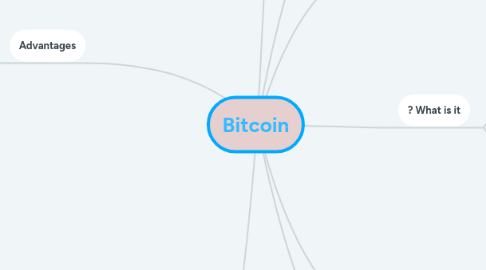
1. Blockchain
1.1. prevents double-spending
1.2. public transaction leader
2. Advantages
2.1. no tracking
2.1.1. Unless users publicize their wallet addresses publicly, no one can trace transactions back to them.
2.2. no taxes
2.2.1. There is no way for a 3rd party to intercept transactions of Bitcoins, and no viable way to implement a Bitcoin taxation system
2.3. mobile payments
2.3.1. Like with many online payment systems, Bitcoin users can pay for their coins anywhere they have Internet access.
2.4. bitcoins cannot be stolen
2.4.1. Bitcoins’ ownership address can only be changed by the owner. No one can steal Bitcoins unless they have physical access to a user’s computer.
2.5. no risk of “charge-backs”
2.5.1. Once Bitcoins are sent, the transaction cannot be reversed
2.6. no transaction costs
2.6.1. Sending and receiving Bitcoins requires users to keep the Bitcoin client running and connected to other nodes.
3. Disadvantages
3.1. no physical form
3.1.1. Bitcoins don't have a physical form, it cann't be used in physical stores. It would always have to be converted to other currencies.
3.2. wallets can be lost
3.2.1. If a hard drive crashes, or a virus corrupts data , and the wallet file is corrupted, Bitcoins have essentially been “lost”.
3.3. bitcoin valuation fluctuates
3.3.1. The value of Bitcoins is constantly fluctuating according to demand
3.4. risk of unknown technical flaws
3.4.1. The Bitcoin system could contain unexploited flaws.
